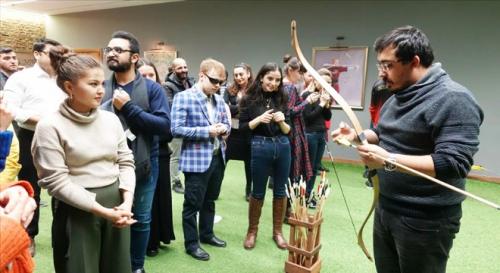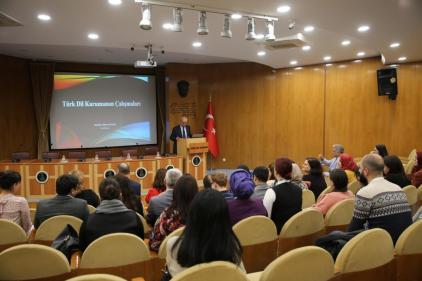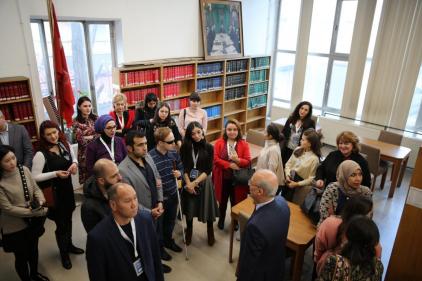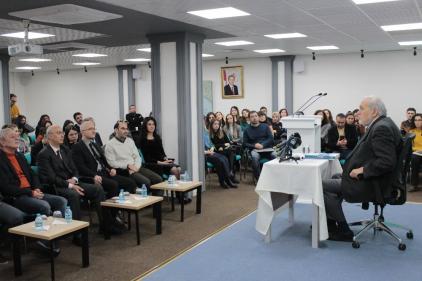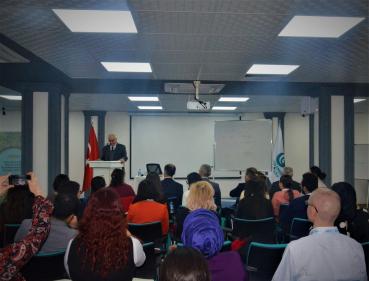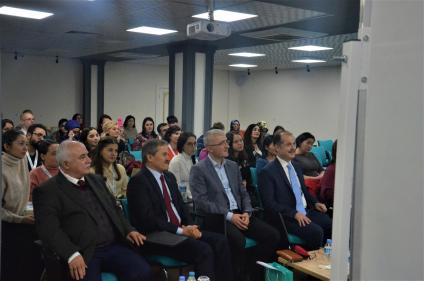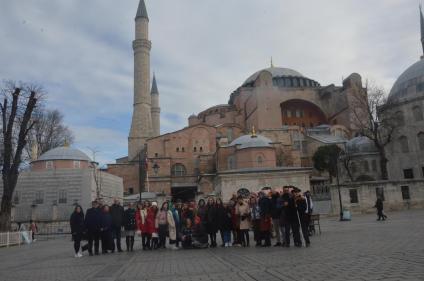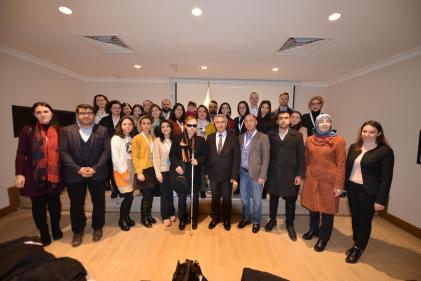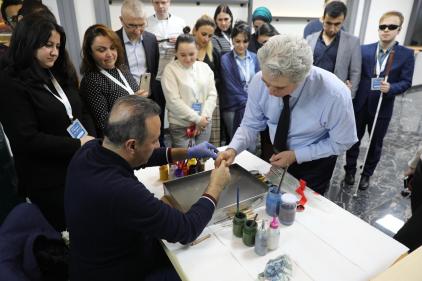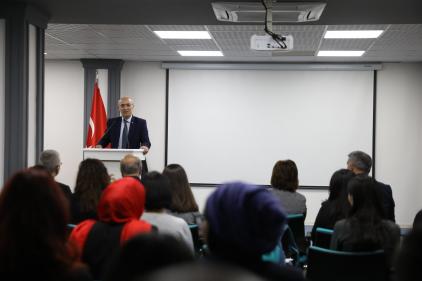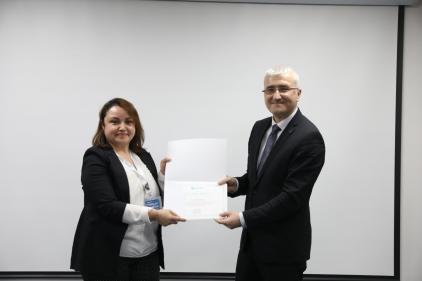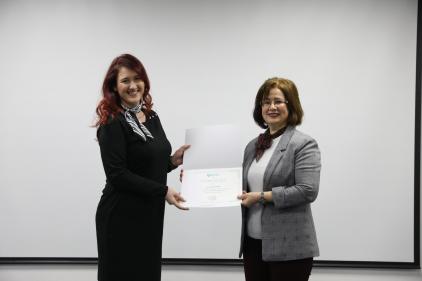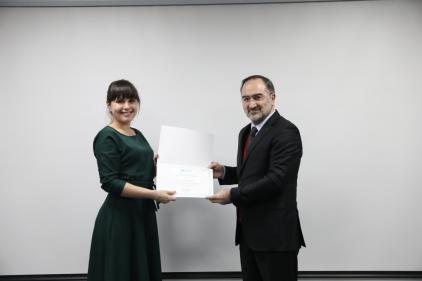Turkology Winter School Ended
As the leading institution in boosting the international recognition, reliability and respectability of Turkish language and culture, and Turkey, Yunus Emre Institute has brought doctoral students of Turkology departments from different countries to Turkey.
Within the context of its "Turkology Project," the Institute engages in cooperation with Turkish, Turkology, and Turkish language and literature departments of universities abroad in order to promote Turkish language, literature, culture and art, and provide services abroad to those who are keen to be trained in this area.
The Institute is working to increase the quality of the Turkish language and literature instruction and institutionalize it, and in this context, it has hosted young Turkologist from different countries who were seeking to work on Turkish language in Turkey at a program held in Ankara and Istanbul between January 27, and February 8, 2020. During Institute's first "Turkology Winter School" program launched for the foreign Turkologists doing their doctorates at the Turkology departments abroad, the participants attended an intensive program of seminars and events during the week days in Ankara and they had a chance to visit historical and tourists sites in Istanbul. At the Winter School, the intricacies of Turkology were taught to the participants by 18 academics from different fields.
The program bringing together Turkey's leading Turkologists and academics with young Turkologists took start with Prof. Dr. İlber Ortaylı's lecture on "Turkish history" on Monday, January 27. The seminars given included "History of Turkish Language" by Prof. Dr. Ahmet Bican Ercilasun, "Old Turkish" by Prof. Dr. Serkan Şen, "Khwarezm and Kipchak Turkish" by Prof. Dr. Mustafa Argunşah, "Old Anatolian Turkish" by Prof. Dr. Gürer Gülsevin, "Ottoman Turkish: Spelling of Words of Turkic Origin" by Prof. Dr. Yavuz Kartallıoğlu, "Shaping, Classification and Comprehensibility of Turkic Written Languages" by Prof. Dr. Mehmet Fatih Kirişçioğlu, "Morphology of Turkish of Turkey" by Prof. Dr. Feyzi Ersoy, "Syntactic Properties of Turkish" by Prof. Dr. Leylâ Karahan, "Theories of Textuality and Coherence" by Prof. Dr. Gülsün Leyla Uzun, "Sources of Classical Turkish Literature" by Prof. Dr. Mehmet Fatih Köksal, "Annotating Literary Texts with Civic Values" by Prof. Dr. Yaşar Aydemir, "Turkish Folk Literature" by Prof. Dr. Esma Şimşek, "Turkic Epic Tradition" by Prof. Dr. Naciye Ata Yıldız, "Turkish Literature in the Second Constitutional Monarchy Era" by Prof. Dr. Nazım Hikmet Polat, "On the Turkish Literature in the Republican Era" by Prof. Dr. İbrahim Şahin, "Yunus Emre" by Dr. Mustafa Tatçı and "Phonetics of Turkish" by Dr. Gönül Erdem Nas.
The participants were also provided with copies of Türkoloji El Kitabı (Turkology Handbook), a book slated to fill the gap in the field, which covers the matters discussed during the seminars.
The participants were 27 doctoral students of Turkology departments from 15 countries, including Romania, Tatarstan, Azerbaijan, Ukraine, Georgia, South Korea, Bosnia and Herzegovina, Russia, France, Serbia, Kazakhstan, Croatia, Poland, and Palestine. They expressed their gratitude for being in Turkey and coming together on the occasion of the program.
In addition to the intensive training, the participants had a chance to visit historical and cultural sites in Ankara and Istanbul. In Ankara, they paid a visit to the Museum of Anatolian Civilizations, the first and second parliament buildings, and Presidential Nation Library, which has the largest collection in Turkey. They also visited the Turkish National Commission for UNESCO and the Turkish Language Society (TDK), where they were briefed about the activities of these organizations. The cultural sightseeing in Istanbul included visits to Sultan Ahmed Mosque, the Hagia Sophia Museum, Basilica Cistern, Topkapı Palace Museum, Galata Tower and the world's oldest market Grand Bazaar. The participants also went to the T3 Foundation and the Archers' Foundation to learn about traditional Turkish archery and technology.
Learning about making arrows, history of archery, how to shoot arrows, they were given a chance to shoot arrows. Visually impaired Viacheslav Chernev, attending the Turkology Winter School from Poland, indicated that it was the first time he shot arrows. "It was a novel experience for me. I have never had such an experience before. It is really delightful. I realized that I can shoot arrows despite my disability," he said.
Zhansulu Akhmetova, from Kazakhstan, noted that she had been Turkey several times, and she chose Turkology as her field in order to study history, culture and language of Turks in depth.
Nashwa Mohamed, from Egypt, pointed that she had been to Turkey many times and had her master's degree on the Turkish language and literature at Dokuz Eylül University. "I love Turkish language and Turkey. I didn't know much about Turkey before studying at this department. We would learn about it only from the soaps. The admiration toward Turkey increased and the number of students attending the Turkish language departments rose in my country thanks to these soaps. In this regard, the Turkish soaps played an important role," she said.
The participants invited to Turkey by the Institute were also able to meet their colleagues from other countries and conduct consultations on their work.


